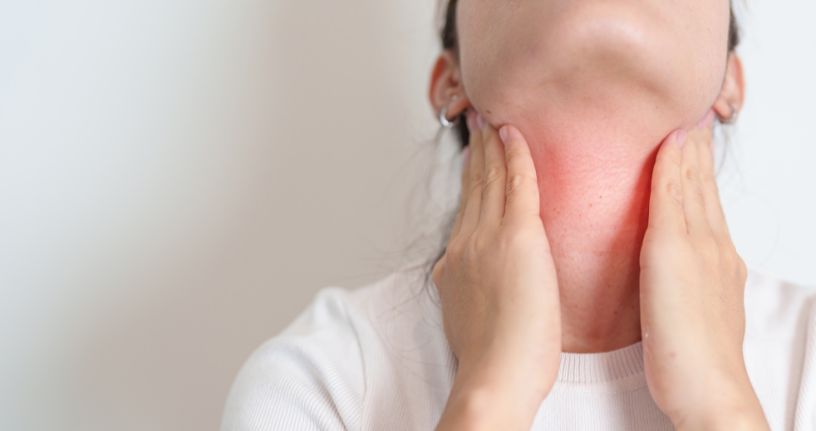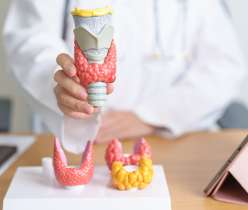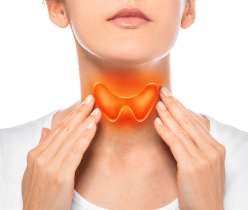Hypothyroidism or underactive thyroid occurs when the thyroid gland at the base of the neck doesn’t produce enough thyroid hormones. These hormones, i.e., triiodothyronine (T3) and thyroxine (T4), are crucial for regulating your body’s metabolism, energy levels, and overall function.
Certain factors can cause hypothyroidism. Let’s understand them one by one.
-
- Autoimmune diseases – Hashimoto’s thyroiditis is the most common cause where the immune system attacks the thyroid gland.
- Iodine deficiency – Iodine intake is essential for thyroid hormone production; its deficiency is common when consuming iodized salt is ignored.
- Thyroid surgery or radiation therapy – Removing or damaging the thyroid can reduce hormone production.
- Medications – Certain drugs (e.g., lithium, amiodarone) can affect thyroid function.
- Congenital hypothyroidism – Some people are born with an underactive thyroid.
- Pituitary or hypothalamic disorders -Rare cases where these glands fail to stimulate the thyroid.
- Postpartum thyroiditis – Temporary hypothyroidism after childbirth.
- How does hypothyroidism affect the human body?
- Hypothyroidism symptoms develop gradually and may vary in severity; these include a slowdown of metabolism, weight gain, fatigue, cold intolerance, constipation, dry skin, and brittle hair, hair loss or thinning, mood swings and depression, puffy face, slow heart rate, hoarseness, pain in joints and muscles, memory issues or brain fog, irregular or heavy menstrual cycles, swelling in the neck (goiter, in some cases).
Timely diagnoses are crucial to identify hypothyroidism level and severity you may be suffering from. Blood tests like TSH, T4, and T3, thyroid antibodies, and physical examination (like checking for goiter, dry skin, or signs of slowed metabolism) help diagnose hypothyroidism accurately.
Hypothyroidism treatment options and what you can do about it
Hypothyroidism medicine:
- Levothyroxine (Synthroid) – A synthetic thyroid hormone that restores normal levels. Hyperthyroidism pills (also known as hormone replacement tablets) are a daily medicine, including Thyronorm 50 mcg, Eltroxin 100 mcg, Linorma T3 20 mcg, etc. The dosage varies from patient to patient, considering the severity of the disease. Take hypothyroidism medicine as your doctor prescribes to manage the symptoms. You will start feeling better one or two weeks after starting the treatment. In most cases, the treatment with levothyroxine is likely to be lifelong.
- Diet intake
- Consume iodine-rich foods (fish, dairy, eggs), but avoid excessive amounts.
- For thyroid support, include selenium and zinc (nuts, seeds, whole grains).
- Avoid goitrogenic foods in large amounts (e.g., raw broccoli, soy).
- Stay informed
- Work with your healthcare provider to understand the root cause of your hypothyroidism (e.g., autoimmune, iodine deficiency) and follow the treatments accordingly.
- Regular monitoring
- Routine blood tests to adjust medication dosage as needed.
- Address underlying causes
- Treat conditions like iodine deficiency or autoimmune disorders appropriately.
- Lifestyle changes
- Incorporate exercise into your daily routine; this will help you boost metabolism, improve mood, and combat fatigue.
- Manage your stress because it can exacerbate your symptoms; practicing yoga or meditation can help.
- Drink a lot of water because keeping yourself hydrated helps combat dry skin and promotes overall health.
- Taking adequate sleep and rest supports healing and energy restoration.
Living with Hypothyroidism
With proper diagnosis, treatment, and care, hypothyroidism can be well-managed, enabling you to lead a healthy, active life.
Adhering to prescribed medication, maintaining a balanced diet, and staying active are key steps to living a healthy life. Regular check-ins with your doctor ensure ongoing medicinal and diet adjustments, which is important for overall health.




